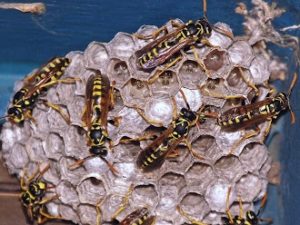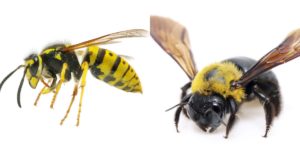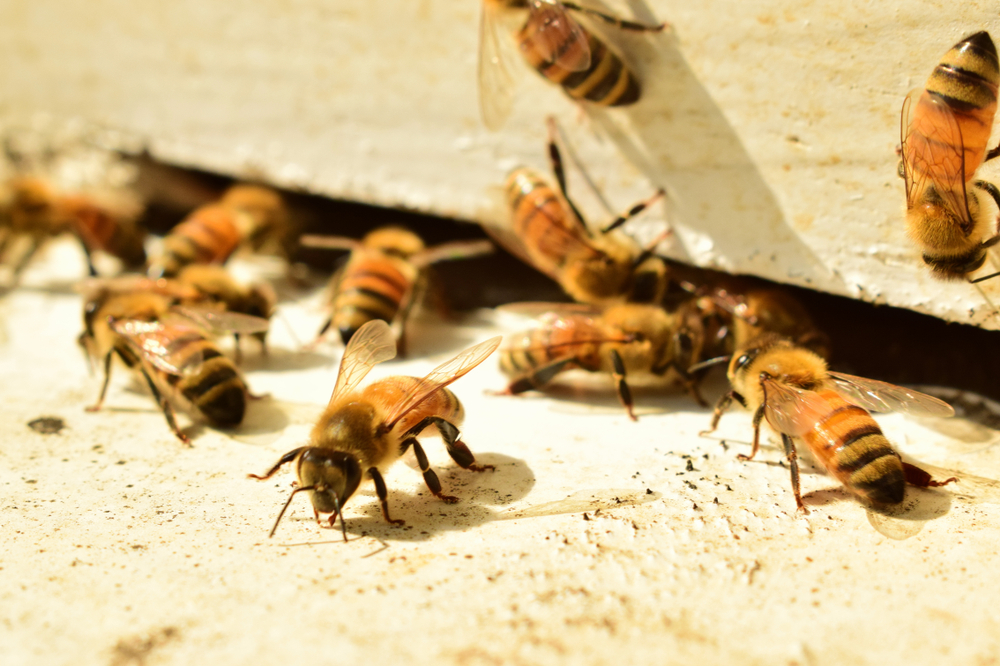Did you know that colonies of hornet wasps in the late summer could contain as many as 700 members? Moreover, wasp nests are much bigger and their inhabitants can reach up to 10.000 members! That is one of the reasons why people want to keep them away from their home.
It is not only important to know how to get rid of those insects but also what is the difference between them as they are not treated the same way when trying to get rid of them. This guide will help you to determine the major difference between these insects as well as how to get rid of them effectively and once for all.
Bees, wasps and hornets – how to spot a difference?
Bees are small little buzzing creatures with yellow and black stripes and hairs on their body.
If you spot a hairless one, you can be sure it is either a wasp or hornet. They are seemingly the same, but wasps have bodies with black and yellow rings and they are much smaller than hornets. Hornets have black and white rings and they are much larger. All three species can be hazardous if found in your home. Best way to get rid of them is to call a professional pest control wasp and hornet removal company.
Important Note on Stings and Allergic Reactions
Wasp stings are a common problem, especially during spring and summer months, when people spend most of their time outside of their home and wasp and hornets get aggressive in search of food. Their stinger contains venom that is transmitted into the person body and can cause an allergic reaction as well as significant pain and irritation. If not carefully treated, the hornet or wasp sting will cause a serious reaction.
What are some of hornet or wasp sting symptoms?
For the majority of people who are not allergic, they will include:
-
- redness
-
- swelling
-
- itching
-
- raised welt around the sting
The raised welt around the stinging area that will disappear within several hours. More major issues are nausea and vomiting and even extreme redness or swelling area that stays for a few days. Anaphylaxis shock is a rare condition but it is a life-threatening state where a person goes into a shock and need to be treated in a hospital.
How to detect a wasp nest?

If you’re detecting a large number of wasps and hornets around your residential or industrial property, there is a high chance you have a nest in your garden, on the roof or nearby your property. It is important to treat the problem immediately as wasps or hornets build nests quickly. The sooner you tackle the wasp nest it will prevent a wasp hornet or bugs nesting causing any further building damages or physical pain caused by wasp stings.
The wasps or hornets usually make their nest from chewed wood pulp or saliva, in sheltered spots with an easy way out, like in wall cavities, garages, gardens or under eaves. You can easily locate the nest if you observe the flight path of returning wasps.
Paper wasps, known as vespid wasps build their wasps nest using fibres from dead wood and plant stems, which they then mix with saliva. The paper wasp then uses these materials to build nests which is a water-resistant nest made of a grey or brown papery material.
How to keep wasps and hornets away from your property?
Below are some simple tips to keep pests away.
Pest Control.
 Firstly, do not try to get rid of them by yourself. You can only make the issue grow bigger by having yourself being stung by a wasp or hornet or by increasing the number of already existing wasps from the nest. If you spot a wasp or hornet nest, contact a professional pest control company who deal in wasp control will inspect and remove the wasp and hornet’s nest in a safe way to assist you with the problem.
Firstly, do not try to get rid of them by yourself. You can only make the issue grow bigger by having yourself being stung by a wasp or hornet or by increasing the number of already existing wasps from the nest. If you spot a wasp or hornet nest, contact a professional pest control company who deal in wasp control will inspect and remove the wasp and hornet’s nest in a safe way to assist you with the problem.
Keep your rubbish tidy.
Once you have successfully solved the issue, try to prevent them from returning. You can do that by knowing what attracts them most when building a nest. Try to keep your garbage clean and in an organised way, making sure food especially fruit in sealed rubbish bags.
Checking your property.
Check your rooftops, loft spaces, sheds, garden heaps, garages and other similar places regularly and get rid of your garbage on a daily basis. Especially to prevent the decomposing of your food waste. Moreover, seal off any entrance to your home and check whether your insulation is suffering from any cracks or water pondering. Best way to prevent the wasp and hornet nests is to take some precautions.
How to trap and kill wasps and wasp hornet nests
Forget D.I.Y and call in the pro’s who will use effective methods to deal with the wasps and hornets. If you are based in Yorkshire, UK, and spot a wasp or hornet nest, do not hesitate to contact Apex Pest Control immediately!
Apex has 30 years experience in dealing with wasp nest and wasp hornets with successful treatment in killing these flying pests. To trap and remove these pests Call 0114 349 1098 and let the local pest control experts trap, treat and kill these bugs quickly and safely.
Contributed by: Pest Control Pros Atlanta – Foremost Experts in Flying insects and pest control

